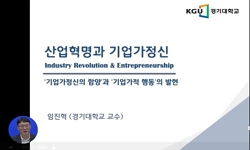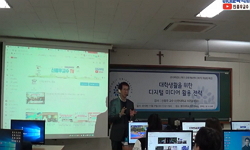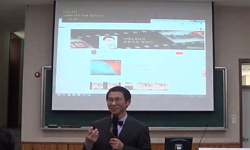급변하는 미래 사회 환경에서의 청년 실업문제 및 직업진로에 대한 불안 요소 극복을 위해서는 다양성에 대응하는 유연한 태도와 주도적인 진로 개발 역량 함양을 통한 실천적 자세가 요구...
http://chineseinput.net/에서 pinyin(병음)방식으로 중국어를 변환할 수 있습니다.
변환된 중국어를 복사하여 사용하시면 됩니다.
- 中文 을 입력하시려면 zhongwen을 입력하시고 space를누르시면됩니다.
- 北京 을 입력하시려면 beijing을 입력하시고 space를 누르시면 됩니다.
대학생의 진로탄력성이 창업의지에 미치는 영향 : 기업가정신 교육 만족도의 조절효과 검증 = The Effect of Career Resilience of College Students on the Entrepreneurial intention : Focusing on the moderating effect of entrepreneurship education satisfaction
한글로보기https://www.riss.kr/link?id=T16819110
- 저자
-
발행사항
서울 : 국민대학교 글로벌창업벤처대학원, 2022
-
학위논문사항
학위논문(석사) -- 국민대학교 글로벌창업벤처대학원 , 창업학전공 , 2023. 8
-
발행연도
2022
-
작성언어
한국어
- 주제어
-
발행국(도시)
서울
-
형태사항
vi, 72 ; 26 cm
-
일반주기명
지도교수: 김종성
-
UCI식별코드
I804:11014-200000694112
- 소장기관
-
0
상세조회 -
0
다운로드
부가정보
국문 초록 (Abstract)
급변하는 미래 사회 환경에서의 청년 실업문제 및 직업진로에 대한 불안 요소 극복을 위해서는 다양성에 대응하는 유연한 태도와 주도적인 진로 개발 역량 함양을 통한 실천적 자세가 요구된다. 특히 사회 진출을 준비하는 대학생들에게 있어서 변화에 대응하는 새로운 혁신이 요구됨에 따라 기업가정신 교육의 필요성 또한 강조되고 있는 현실이다. 이는 비단 취업에만 국한되는 요구 역량이 아니며, 지속적으로 확장되고 있는 창업 생태계에서 창업 지원 정책을 대하는 대학생의 수요와 창업의지 변화에도 영향을 미칠 것이다.
본 연구의 목적은 대학생의 진로탄력성이 창업의지에 미치는 영향을 조사하고, 기업가정신 교육 경험 여부를 통제한 상태에서 기업가정신, 진로탄력성과 같은 개인의 내적 영향요인이 창업의지에 미치는 영향을 분석하여 이를 향상시킬 수 있는 대학생의 기업가정신 교육 만족도의 조절효과를 통해 기업가정신 교육의 필요성을 확인하고 활성화하는 것에 있다.
이를 위해, 기업가정신과 진로탄력성을 독립변수로 하고, 기업가정신 교육 만족도를 조절변수로 하는 연구 모형을 상정하였으며, 기업가정신 및 진로탄력성과 창업의지와의 관계에서 기업가정신 교육 만족도의 조절 효과를 확인하기 위해 본 연구를 진행하였다.
기업가정신 교육 또는 창업 관련 프로그램에 참여한 경험이 있는 대학생으로 통제한 상태에서 해당자를 대상으로 2023년 3월에 온라인 설문조사를 실시하였다. 총 130부를 회수하였으며, 이 중 오류 응답의 설문 7부를 제외한 123부의 설문지에 대해 실증 분석을 실시하였으며 주요 연구 결과는 다음과 같다.
첫째, 기업가정신의 ‘진취성’과 ‘위험감수성’은 대학생의 창업의지에 유의한 영향을 미치고, 기업가정신의 ‘혁신성’은 대학생의 창업의지에 영향을 미치지 않았다.
둘째, 진로탄력성의 ‘창의성’, ‘도전정신’, ‘미래지향성’은 대학생의 창업의지에 유의한 영향을 미치고, 진로탄력성의 ‘유연성’은 창업의지에 영향을 미치지 않았다.
셋째, 대학생의 기업가정신 교육은 기업가정신의 ‘혁신성’과 결합하여 창업의지와의 관계에서 유의한 영향을 조절하며, 기업가정신의 ‘진취성’, ‘위험감수성’과의 결합은 창업의지에 조절 영향을 미치지 않았다.
넷째, 대학생의 기업가정신 교육은 진로탄력성의 ‘창의성’, ‘유연성’, ‘도전정신’, ‘미래지향성’ 모두 창업의지에 조절 영향을 미치지 않았다.
본 연구의 결과로 기업가정신 교육이 대학생의 창업의지 촉진에 부분적으로나마 조절 역할을 하는 것으로 확인됨으로써 대학생을 대상으로 하는 기업가정신 교육의 중요성과 정당성을 확인할 수 있었던 반면에 그 영향이 미미하다는 결과는 눈여겨볼 필요가 있다. 확대되고 있는 창업 지원정책과 더불어 대학과 창업 보육기관 등 교육기관에서 다양한 내용과 방식의 기업가정신(창업 관련) 교육이 활성화되었음에도 불구하고 학습자가 교육 내용의 영향을 부분적으로만 받고 있다고 해석될 수 있다.
이는 기각된 영향요인에 대한 필요성의 반증이며, 기업가정신 교육이 앞으로 어떻게 변화해야 하는지 발전 방향성을 시사한다. 이를 위해 교육의 내용과 방식 및 학습자 분석 등 기업가정신 교육의 방향성에 대한 후속 연구의 필요성을 제기하고자 한다. 또한, 후속 연구과정에서 대학생의 기업가정신과 진로탄력성의 영향요인 검증 및 다양한 기업가정신 교육 관련 연구를 위한 참고 자료로서 도움이 되고자 한다.
다국어 초록 (Multilingual Abstract)
In order to overcome the challenges of youth unemployment and alleviate anxieties surrounding career choices in a rapidly changing future society, a practical approach involving a flexible attitude towards diversity and proactive career development is...
In order to overcome the challenges of youth unemployment and alleviate anxieties surrounding career choices in a rapidly changing future society, a practical approach involving a flexible attitude towards diversity and proactive career development is required. Especially for university students preparing for social engagement, the demand for entrepreneurship education has been emphasized due to the need for innovative responses to ongoing changes. This demand for entrepreneurial competencies extends beyond employment and is expected to influence the changing entrepreneurial intentions of university students in the expanding startup ecosystem.
The purpose of this study is to investigate the impact of college students' career resilience on entrepreneurial intention and analyze the moderating effect of entrepreneurship education satisfaction on the relationship between individual internal factors, such as entrepreneurship and career resilience, and entrepreneurial intention. The study aims to confirm and promote the necessity of entrepreneurship education for college students by examining the moderating effect of entrepreneurship education satisfaction in enhancing these factors.
To achieve this, a research model was proposed, with entrepreneurship and career resilience as independent variables, and entrepreneurship education satisfaction as a moderating variable. A survey was conducted online in March 2023 among college students who had participated in entrepreneurship education or startup-related programs. A total of 130 responses were collected, and after excluding 7 surveys with invalid responses, empirical analyses were conducted on the remaining 123 surveys. The key findings of the study are as follows:
First, the proactiveness and risk-taking of entrepreneurship significantly influence college students' entrepreneurial intention, while the innovativeness does not have a significant impact.
Second, it was discovered that career resilience's creativity, challenging spirit, and future orientation had a significant impact on college students' entrepreneurial intentions, while the flexibility does not have a significant impact.
Third, entrepreneurship education for college students has a significant moderating effect when combined with the innovativeness of entrepreneurship, but no significant moderating effect when combined with the proactiveness and risk-taking.
Fourth, entrepreneurship education for college students does not have a significant moderating effect on any dimensions of career resilience, including creativity, flexibility, challenging spirit, and future orientation.
The results of this study confirm the partial moderating role of entrepreneurship education in promoting college students' entrepreneurial intention, highlighting the importance and justification of entrepreneurship education targeting college students. However, the limited impact suggests the need for further investigation into the factors that have been rejected, as well as the future directions for the development of entrepreneurship education. Future research should explore the impact factors of college students' entrepreneurship and career resilience, and serve as a reference for various entrepreneurship education-related studies, including the content, methods, and learner analysis of entrepreneurship education.
목차 (Table of Contents)
- 제1장 서론 1
- 1.1. 연구의 배경 및 목적 1
- 1.2. 연구방법 3
- 1.3. 논문의 구성 4
- 제2장 이론적 배경 5
- 제1장 서론 1
- 1.1. 연구의 배경 및 목적 1
- 1.2. 연구방법 3
- 1.3. 논문의 구성 4
- 제2장 이론적 배경 5
- 2.1. 기업가정신(Entrepreneurship) 5
- 2.2. 기업가정신 구성요소 9
- 2.2.1. 혁신성(Innovation) 10
- 2.2.2. 진취성(Proactiveness) 11
- 2.2.3. 위험감수성(Risk-Taking) 12
- 2.3. 진로탄력성(Career Resilience) 12
- 2.4. 창업의지(Entrepreneurial Intention) 18
- 2.5. 기업가정신 교육 만족도 21
- 2.5.1. 기업가정신 교육 22
- 2.5.2. 교육 만족도 25
- 제3장 연구 모형 및 가설 설정 26
- 3.1. 연구모형 26
- 3.2. 연구가설 설정 27
- 3.3. 변수의 조작적 정의 및 측정 방법 29
- 3.4. 자료처리방법 33
- 제4장 실증분석 및 가설검증 34
- 4.1. 표본의 특성 34
- 4.2. 변수에 대한 요인분석 및 신뢰도 분석 36
- 4.3. 기술통계 및 상관관계 분석 41
- 4.4. 가설검증 43
- 4.5. 분석요약 49
- 제5장 결론 50
- 5.1. 연구결과 및 시사점 50
- 5.2. 연구의 한계 및 향후 연구과제 52
- 참고문헌 54
- ABSTRACT 65
- 부록(설문지) 68












